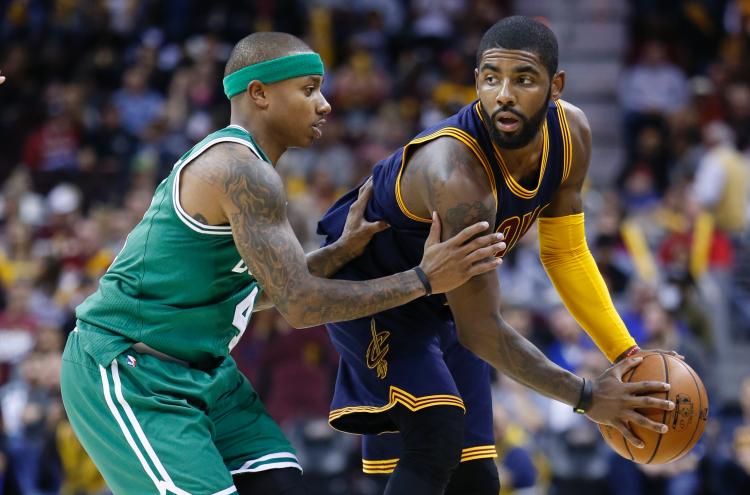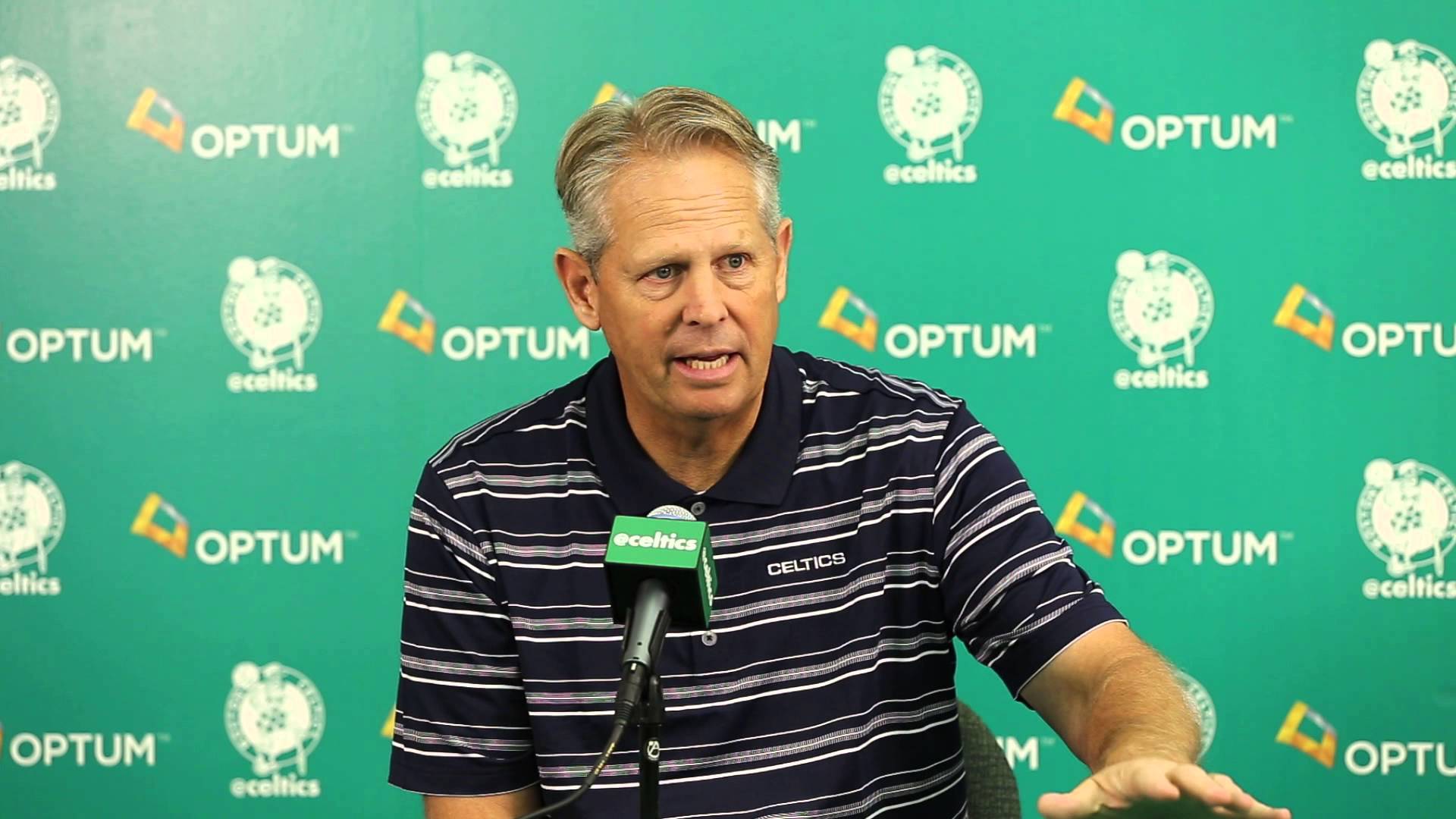|
Trades, by nature, are tricky. All parties involved want to come out as "winners", no matter how they define it in their mind. Some may define it by getting the best player, others by getting financial flexibility, others by adding draft picks. Finding a deal that provides these alternatives to a team is difficult to do, and these two trade partners were particularly frugal.
Cleveland is in between a rock and a hard place: Kyrie Irving demanded a trade, LeBron is on edge with management and may not come back next year, but the organization must try to win this year if they hope to keep King James. Boston, in trying to vault past Cleveland, saw an opportunity to land a superstar to help get them past their Eastern Conference foe. Looking at a deal like this from any side strongly paints Cleveland as being a winner. Their backs were against the wall with the Kyrie Irving trade demand and building tensions between LeBron James and owner Dan Gilbert. Cleveland had the largest salary in the league, no draft picks at their disposal and the need to continue to compete for an NBA Title while also preparing for a potential future without LeBron. Accomplishing both seemed nearly impossible before the trade was announced.
Koby Altman's first deal as Cavaliers GM is an absolute home run when you consider Kyrie a lost cause of an asset. The moment the rest of the league found out about his trade demand his value began to rapidly depreciate, hitting closer and closer to its lowest-conceivable point as the regular season grew near. Now they turned him into a top-five scorer from last season, one of the better 3-and-D wing/ forwards in the league, a 2017 first-round draft pick and the golden ticket to post-LeBron insurance: Brooklyn's 2018 pick.
Cleveland pulled off nailing both facets of their trade Ben Falk marked as difficult. The short-term value of having Isaiah Thomas instead of Kyrie Irving won't change much. Both are above 50 percent finishers near the rim, strong three-point shooters on high volume and point guards with overall low turnover rates. The Cavaliers offense won't change much with Thomas instead of Irving, except they'll face the added challenge of defenses that try to take away his left hand so sharply (I.T. scored nearly 30 PPG last year; I don't think those efforts do too much). Defensively Isaiah may be a small downgrade from Kyrie, but not one that will hurt them too much or be felt by the rest of the roster. The team needed to address perimeter defense this summer and failed to by adding Derrick Rose and Isaiah Thomas (world's strangest fits at point guard, by the way). Still, not a downgrade too severe from Rose and Kyrie. The gap between Isaiah and Kyrie's production may not have been too great, but the talent level is not quite even. Jae Crowder, as one of the most underrated players on an amazing team-friendly contract, swings the scales of talent back in favor of the Cavs on this loot. Crowder, per Synergy sports tech, had an effective field goal percentage of 66 percent in unguarded catch-and-shoots, while also allowing 32 percent shooting in isolations defended. His defensive attribution for the Cavaliers is two-fold: he adds another forward that can switch and brings toughness to the table. That'll help the Cavs in their pursuits of the Warriors, who have a litany of forwards to defend. The second factor: it takes away their biggest threat in the East's best LeBron defender. It's addition by virtue of the Celtics not having Crowder anymore. Regardless of these two teams being trade partners, that movement away from Boston has to count for something. Zizic didn't impress during the summer league the way many expected, but it's too soon to bail on the 2016 first-rounder. The big man is an excellent finisher near the rim, and the Cavs haven't had a reliable backup center since LeBron returned to town. If he develops into a guy that can give them 10 minutes per game this season, he's helped the LeBron-led Cavs short-term. The cap implications for this season got so much better for the Cavs and owner Dan Gilbert, who signs the paychecks. This trade directly saves the Cavaliers $29.1 million against the luxury tax. Altman walked into a toxic situation, where the last GM performed well but drove up spending beyond what Gilbert began to pallet. The new guy was able to get rid of Cleveland's Kyrie problem while saving the boss a cool $30 million. Nice start. Long-term Cleveland isn't out of the woods, but that 2018 Nets draft pick certainly helps. It's essentially LeBron insurance where, if James leaves, they'll have a top youngster, two years of Kevin Love, two years of Tristan Thompson and the Bird rights to re-sign Isaiah Thomas. Teams worry about wanting to pay I.T. the max, but this trade could drive down his value thanks to the lack of statistical production he'll achieve while playing second-fiddle to LeBron. Much has been made about the Cavaliers possibly not re-signing Isaiah should LeBron leave, instead choosing to strip down and trade the likes of Love and Thompson to build a more sustainable team for the long-term beyond 2020. That conversation certainly occurred, and is one reason why the Cavs insisted on getting that 2018 pick from Brooklyn unprotected. They couldn't stomach a scenario where they traded Kyrie for a one-year usage of Isaiah and Jae Crowder with LeBron leaving. The difficulty comes most from what happens if LeBron tries to stay, in which case they have to retain Isaiah. These cap savings of immediate impact from the trade will come right back next summer when the Cavaliers pay Thomas his due. That isn't ideal, and it will be expensive, but at least the Cavs got rid of their Kyrie problem and picked up a 2018 high-value pick for their troubles. Huge win today for the Cavaliers.
Danny Ainge has been after his golden boy ever since he pulled the trigger on that huge deal with the Brooklyn Nets in 2013. Every move since then has brought the team to the point where they can attract free agent stars, have great young talent and still have enough chips to trade for one more. It was the master plan, and it was driven by a timeline as much as a necessity.
Ainge built that timeline for himself when he inked Horford to the contract last summer, establishing a minimum five-year window where the Celtics were to be competitors. Those Nets picks would come due, so the C's could augment their stars with youngsters or leverage those assets for other great pieces via trade. This summer the Celts got star number two with Gordon Hayward, and expedited that timeline. To compare where the Celtics were at 18 months ago with the roster they have now is a moot point. Of course Kyrie Irving, Hayward and Horford are more impactful than Isaiah Thomas, Avery Bradley and Jared Sullinger. Judging this trade for what its worth though has as much to do with the cultural impact as it does the overall talent of the move. Kyrie demanded a trade from the Cavaliers a few months back, tired of playing second-fiddle to LeBron James and being "son'd" by the greatest player in the world. It was his time to prove he was the number-one option on a championship team. No disrespecting the confidence that type of statement takes, but there's something unsettling about acquiring a player that put himself and his own individual success above the desire to win championships and hang banners. Boston offers Kyrie both, but Kyrie offers the Celtics a drop-off in competitiveness from Isaiah and Jae Crowder, the literal heart and soul of this past season's Celtics team. Both are fiercely competitive and great locker room presences. To go from them and a consummate pro in Avery Bradley to Kyrie is a tough hit for team chemistry. Additionally Irving rates out as a fairly overrated player. Last year the Cavaliers were better defensively without Irving (0.02 PPP) than the Celtics were without Thomas (0.009 PPP). For all the flack that I.T. gets defensively, it's not like Irving is a clear upgrade. Offensively Irving test out as efficient thanks to what I describe as the LeBron factor. Those numbers change drastically when he's the number one option. I'm very much of the notion Kyrie is overrated, and with that notion it's hard to separate that from my analysis of how strong Boston's loot is. But Kyrie for three years is different than Isaiah for one, and the Celts clearly decided they didn't want to pay the max to a guy like I.T. So if you were to ask if I'd rather have Isaiah on a max and Jae, or Kyrie... I'd probably take Kyrie. As mentioned in the section for the Cavaliers, theres a huge loss for the Celtics by way of Crowder's defense on LeBron. Now that mantle is forced upon Gordon Hayward, second-year player Jaylen Brown or rookie Jayson Tatum. Others can provide change-of-pace options like Marcus Smart or Marcus Morris, but those three must be ready to tackle the challenge of defending King James. Losing both Crowder and Bradley in the same summer definitely hurts. Moreso than losing Thomas's heart, or Crowder's toughness, or even the potential of Zizic, that 2018 first-rounder hurts most. Ainge has long coveted that pick as the final stake in his masterpiece Brooklyn deal. Many jokes were made at his expense about his unwillingness to part from those stashed draft picks when the opportunities presented themselves. Jimmy Butler and Paul George were names on the table earlier in the spring, neither of whom had the price tag attached that Kyrie did. It's not to say Ainge was a fool for turning them down. Hayward came via free agency, and this summer had an unbearably poor pool of point guards on the market. Taking Butler or George with Isaiah would indeed run up the spending bill for next summer; Hayward and Kyrie is a much more flat, linear way to approach their contract status -- especially with Tatum and Jaylen eventually expecting extension. But was that 2018 pick necessary to achieve that type of salary synergy within their core? In my all-too-early analysis of the 2018 draft, it projects to me as the strongest draft since the famed 2003 year with LeBron, Melo, Wade and Bosh. Six players -- Marvin Bagley III, Michael Porter, Luka Doncic, Mo Bamba, DeAndre Ayton and Robert Williams -- have top-pick potential. Porter, bagley and Doncic are all guys that would be legitimate threats to go number one in any draft. But with that much top-heavy talent, giving up on what's highly likely to be a top-five pick seems insane. If that's the cost of doing business, then it's the only thing Ainge could have done to pull the trigger on the deal. But if you're asking for an evaluation today if that is a risk I'd take, the answer would be no. Only time will tell how this works out, and the Celts have their core clearly defined for years to come. The chips Ainge holds have finally been cashed in. We'll see just how good they really fit together.
0 Comments
Leave a Reply. |
Adam SpinellaHead Boys Basketball Coach, Boys' Latin School (MD). Archives
September 2021
Categories |


 RSS Feed
RSS Feed
